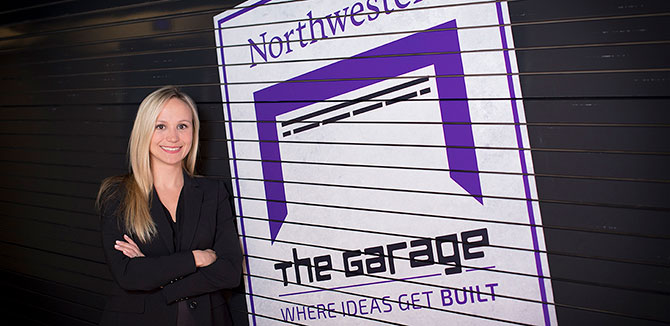Encouraging Innovation and Entrepreneurship
Melissa Kaufman, Executive Director of The Garage at Northwestern University, talks about why understanding "the language of business" matters for entrepreneurs.
The Northwestern Master of Engineering Management (MEM) program is focused on giving students a foundation in engineering and business that will allow them to become better leaders who understand the language of business and know how to communicate and lead.
In 2020 and for the foreseeable future, one of the most important words in business will be innovation. To help prepare students for this reality, MEM encourages students to become entrepreneurs and experience the development of an individual product as well as an entire business.
MEM is not alone in this strategy.
The Garage is the hub for student entrepreneurship and innovation at Northwestern. The Garage is open to any student on campus, and since 2015 when it first opened, multiple teams of MEM students have taken advantage of the unique resource.
Melissa Kaufman is the Executive Director of The Garage. She is a startup veteran and entrepreneur with a decade of experience at consumer technology companies in Silicon Valley. She recently took the time to talk about innovation, entrepreneurship, her role at The Garage, and what advice she would give to MEM students.
What common traits have you found among entrepreneurs?
Many, if not all of the student entrepreneurs I’ve met at Northwestern are inspired to make our world better through their ideas. But being an entrepreneur isn’t easy, is often lonely, and is a winding path with tons of twists and turns. Entrepreneurs need to be flexible, great with managing their time, and develop the ability to get back up again after hearing “no.” Resiliency is essential to success. This, combined with the desire to work hard — for example, student founders at The Garage are often working in the space in the middle of the night — and a willingness to learn are some of the common traits I’ve found among student entrepreneurs.
How important is understanding to accept and learn from failure?
Learning from failure is one of the vital pillars we hope to teach students at The Garage. At our weekly Family Dinners, we invite students to share a recent failure and what they learned from it, and then they pop a confetti popper to celebrate. It might seem silly, but in a culture of needing good grades and pressure to follow linear paths, it’s important for students to understand that making a mistake not only leads to learning, but to resiliency.
Silicon Valley Product Executive Birju Shah teaches Product Management in MEM and recently talked about the importance of storytelling in presenting a new product/idea. What role do you see storytelling playing for innovators and entrepreneurs?
As human beings, we naturally relate to and understand stories. They often speak to us more than raw data can, and they help us to grasp and remember difficult concepts we might not be familiar with. Many successful innovators and entrepreneurs are experts in their field, but most times, the audience or customer is not. A story creates a relatable presentation and is essential for a successful pitch to investors, customers, and the world.
Students in MEM are intentionally taught "the language of business" to go along with their engineering knowledge. How important do you think that the balance of business understanding and tech skills is for entrepreneurs?
The technological knowledge is obviously critical to the development of a product or an idea, but the business acumen is equally important. A founder with an incredible product or idea might find themselves having a hard time raising money or developing a viable business plan, so being able to speak “the language of business” helps. Many student entrepreneurs at Northwestern leverage the talent of other students in different schools for this. For example, a McCormick student founder may reach out to students at Medill for help with marketing or writing.
You've said in the past that "a diverse ecosystem is a healthier ecosystem." Why do you think that is?
A diverse ecosystem is important for so many reasons. Being able to ask a question of a peer sitting at the table next to you, and knowing they may have a different set of perspectives and experiences, is so often the key to solving a problem. At The Garage, we seek to create a diverse community of student founders. We also seek out diversity in the types of ventures we accept into our Residency program because we genuinely believe student founders can and should learn from each other, even if their ideas are worlds apart. We also ensure our students represent different schools, different majors, and different levels of study from across Northwestern for the same reason.
What other advice would you give to students in the MEM program?
If you have an idea or want to explore entrepreneurship, do it while you’re a student. You’re surrounded by amazing resources like space and faculty who’d love to help. You can participate in university-based business competitions to gain access to capital and you’re part of a community. These types of resources can be difficult to find after you graduate.


